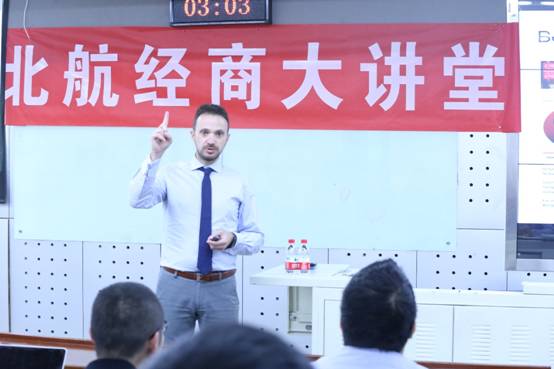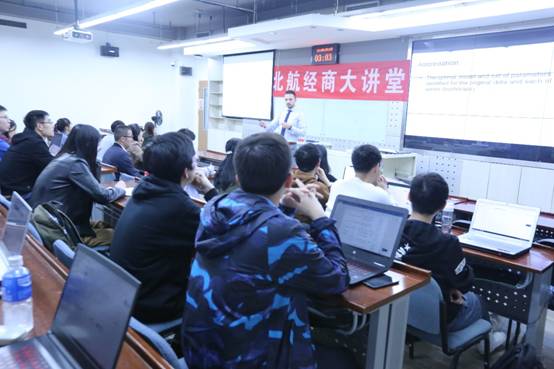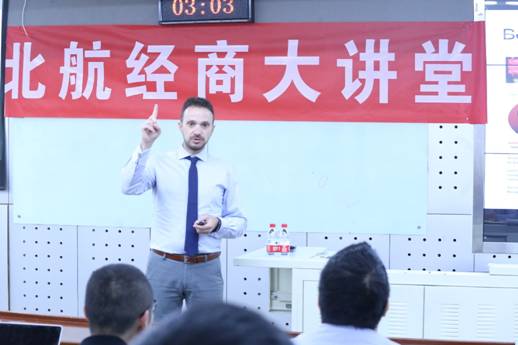英国巴斯大学FotiosPetropoulos副教授做客北航经商大讲堂
2019年4月26日,英国巴斯大学管理学院副教授,International Journalof Forecasting副主编Fotios Petropoulos副教授来到北航9999js金沙老品牌,做客第28期北航经商大讲堂,他的报告题目是Bagging with Real Data。9999js金沙老品牌康雁飞副教授主持了本次大讲堂。经管学院师生40余人参加了此次报告会。

报告会上,Fotios Petropoulos副教授指出现有的时间序列预测模型通常很难捕捉真实的数据生成过程,这使得很多研究者使用两种或多种预测方法的组合来达到更好的预测精度。而他展示了一种新的方法,这种方法不对残差进行bootstrapping,而是使用一个海量数据库,来寻找相似的时间序列。通过预测这些相似的时间序列(假定数据生成过程)或者直接使用它们的未来数值来做预测(不用假定数据生成过程)。在真实数据上的测试表明这种方法提高了预测精度,尤其是在有限历史信息的情况下,这种方法具有明显优势。

在报告结束后,Fotios Petropoulos副教授与经管学院师生进行了亲切的互动交流,一起探讨报告中所涉及模型 的合理性及适用性等问题,Fotios Petropoulos副教授报告会在热烈的学术氛围中圆满结束。
FotiosPetropoulos副教授个人简介:
Fotios Petropoulos,英国巴斯大学管理学院副教授,InternationalJournal of Forecasting副主编。他的研究领域包括时间序列预测、预测的判断方法、统计模型选择及商业预测过程。Fotios主要围绕两个方面研究如何提高预测精度:(1)他研究如何通过时间转换和分层来从时间序列数据中提取额外的有价值的信息;(2)他研究预测和管理决策之间的相互关联。
On26th April, 2019, we welcomeAssociate Prof. Fotios Petropoulosto our series lecture on “Economics and Business”, as well as his speech onBagging with Real Data.FotiosPetropoulos is Associate Professor at the University of Bath, UK, and AssociateEditor for the International Journal of Forecasting. He is interested inresearch on time series forecasting, judgmental approaches for forecasting,statistical and judgmental model selection and integrated business forecastingprocesses. Fotios’s research so far has focused on the improvement offorecasting processes and more specifically around two streams. First, he hasexamined how additional information can be extracted from time series datathrough time transformation (temporal aggregation) and the use of hierarchies.Second, he has investigated interactions between forecasting and managementjudgment. The lecture was hosted by Associate Prof. Yanfei Kang from School ofEconomics and Management at Beihang University.

Inthe following lecture,AssociateProf. Fotios Petropoulos has presented that theexisting portfolio of models within a forecasting software is, very often, notable to capture the true data generating process (DGP). This had led manyresearchers to combine the forecasts from two or more forecasting models and,on average, achieve better accuracy. One approach to forecasting combination isbootstrapping and aggregation, or bagging. In this approach, the remainder ofthe data from a decomposition method is bootstrapped and then used to createnew instances of the original series. Each new series is forecasted separatelyand the forecasts are then combined. In this talk, we present a new approachwhere instead of bootstrapping the remainder to create a new series, we use alarge database to find similar time series. These similar series are eitherforecasted using familiar models, explicitly assuming a DGP, or their “future”values are directly taken as forecasts in which case no DGP is assumed. Ourapproach is tested on real data and shows promising improvements over standardbenchmarks, especially when historical information is limited.

Duringand after the lecture, more than 40 scholars and students from BUAA SEM discussedthe key points of the talk with Associate Prof. Petropoulos, and also raised quitea few relevant questions,which provoke further thinking on the issue from both parties.
